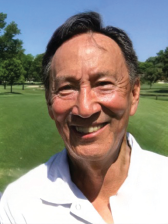
Alex Chiu, “aged” courtesy of FaceAPP.
YouTube videos of cats chasing a laser pointer. The bucket challenge. Planking. These are just a few cultural phenomena over the past decade that have captured the imagination. And, in this day of depressing news of mass shootings and divisive political talk, who doesn’t need a break from reality for something harmless and fun?
Explore This Issue
September 2019Earlier this month, a friend of mine sent me an altered photo of myself from an app called FaceApp. The app uses image analysis and artificial intelligence to predict what you would look like when you turn 75 years old. Upload a photo and it can make the subject also look younger, put a beard on her or give him bangs. Three seconds later, you have something to share with your friends for a good laugh. Celebrities were getting in the act, and images were going viral on social media. I’m usually a sucker for things like this, and I spent the next day having a good time with the app at work. My nurse was aghast when I showed her a picture of herself with a beard, and an age-doctored picture of my 9-year-old son made him look like Yoda with a boy’s haircut. It was all fun and games until I later read on the news about the controversy surrounding FaceApp. Although the app had been created in 2017 and had 80 million active users, this latest viral craze caused one tweeter to look into the origins of the app. Flags were raised when it was revealed that the developer was based in Russia, and conspiracy theories abounded of personal images being stored in a data warehouse in Russia. Real or not, privacy concerns arose and I decided against using the app any longer.
Aside from a few laughs, the situation did get me to think about something that often comes up in our lives as physicians, spouses, and parents. What are some things I wish I hadn’t done if I had the experience and wisdom of a 75 year old? And conversely, what is so wrong with having, at times, the impetuousness of youth that caused me to dive headlong into a viral craze?
I have the good fortune of being part of an academic department in which three former chairs are still employed. One of them is Larry Hoover, who has had an illustrious 40-plus year career at UCLA and KU. Larry also happens to be among the most interesting people in otolaryngology. The next time you talk to him, ask him to tell you the story about the Yeti he saw in Nepal or how he got kicked out of Dodger stadium three innings before the famous Kirk Gibson World Series home run. Larry and I have clinic together on Tuesdays and I asked him what age and experience has taught him. He talked about how the problems and complications he experienced in otolaryngology have taught him more than the successes that are often soon forgotten. Sharing these problems with others was cathartic, and he encourages younger surgeons to own up to their mistakes and take advantage of their partner, mentors, and even on-line anonymous blogs, for constructive advice. Larry also shared this nugget that he has kept in mind throughout his career. Early on in his residency, he got a great piece of advice from a clinical faculty nearing retirement. “Young man, the secret of success in otolaryngology, or any line of work really, is to work hard when you are busy and learn to enjoy it when you are not.”
That is a wonderful piece of advice, and really lines up well with what is often preached about as a key to work-life balance as an otolaryngologist. This is something that all of us should have in common, regardless of age or level of experience. One other thing we should all have in common is the want and desire to embrace change even when it can be disruptive. Our younger generation of physicians grew up in the age of disruptive innovation and technology. They not only follow this disruptive innovation, they demand it and they lead it. It is certainly changing how the business world is conducted and medicine needs to follow in this mindset. There are plenty of physicians who grumble about the EMR, but keep in mind the better care it coordinates for our patients. Other physicians prefer practicing by the “art of medicine” as opposed to following clinical practice guidelines and evidence-based medicine. You can’t tell me that analyzing the last 20 years of outcome studies on thousands of patients in multiple centers is not going to produce a better conclusion on how to treat a certain disease than a single practitioner in an isolated practice in the world. Academic societies and publishing companies would be wise to embrace the “disruptive” ideas of the younger generation. Failure to do so will make them obsolete as technology, the demand for diversity and inclusion and the need for instant recognition will make their bylaws and business practices generated decades ago feel antiquated and out of touch.
Experience and the want for disruptive change are wonderful when used in balance with each other. Thanks for reading and I look forward to talking next month.